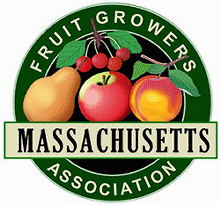Massachusetts fruit growers must grow the best fruit they can for market. This requires many production decisions including insect, weed, disease and crop load management. The Massachusetts Fruit Growers Association has a long history of supporting the UMass Extension Fruit Team through, among other means, distribution of small research grants.
Precision Apple Crop Load Management- Jon Clements, Extension Tree Fruit Specialist
Precision Crop Load Management (PACMAN) helps growers achieve optimal apple fruit growth through various modeling tools. These models, accessed in the form of an app, can be complicated in terms of deciding which one to use and how best to interpret the model's output. This project proposes to field test the suite of PACMAN apps available to determine practicability of adoption, ease of use and economic viability.
Assessing Weather Impacts on Insecticide Efficacy for Three Key Insect Pests of Apple and Validating Grower-Friendly Plum Curculio Monitoring Tool- Dr. Jaime Piñero, Extension Faculty
A promising insecticide alternative utilizing a potent plant-based attractant has emerged as a cost-effective management tool. To evaluate its effectiveness, a research initiative will compare this new lure with the older, more expensive version, while also examining the residual efficacy of various insecticides after rainfall events.
Multi-state Coordinated Evaluation of Grape Cultivars and Clones at Cold Spring Orchard- Dr. Elsa Petit, Senior Lecturer, Stockbridge School of Agriculture
This project will expand the grape cultivar trial currently at the UMass Cold Spring Research and Education Orchard in Belchertown, MA to evaluate the adaptability and performance of grape varieties in humid climates like we experience in Massachusetts. New cultivars will replace underperforming ones providing local grape growers with information on varietal selection and sustainable vineyard management.
Chemical and Experimental Bindweed Control in Blueberry Plantings - Dr. Maria Gannett Extension Weeds Specialist & Matthew Bley Small Fruit Extension Educator
In the management of perennial weeds in blueberry fields, traditional herbicides offer limited control. Due to the shallow roots of blueberries tillage is a challenge. This project explores the efficacy of quinclorac and flumioxazin for perennial weed control in blueberry fields. Additionally, the use of nitrification inhibitors is investigated to alter nitrogen availability, potentially favoring blueberries over weeds. By combining herbicide treatments and cultural strategies, the project aims to optimize weed management practices while minimizing environmental impact and preserving blueberry yields.
Understanding Latent Infections Causing Apple Bitter Rot- Ms. Elizabeth Garofalo Extension Tree Fruit Pest Management Specialist
In recent years both incidence and severity of apple bitter rot has increased with the potential to cause up to 50% crop loss. Traditional fungicide applications may leave growers vulnerable to incurable latent infections which produce additional infections once disease symptoms are visible, necessitating continuous fungicide use to protect against disease spread of an epidemic nature. This project aims to identify the climatic conditions leading to latent apple bitter rot infections in Honeycrisp apples.
By working together, the Massachusetts Fruit Growers Association and the UMass Extension Fruit Team are building a more sustainable future!
